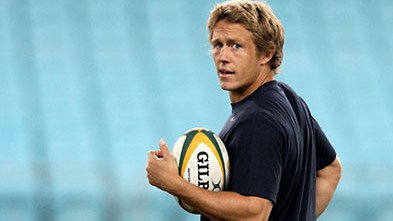EXCLUSIVE: Rugby icon Jonny Wilkinson is responsible for probably the most exciting moment in the history of rugby, when he dropkicked the winning goal in the last minute of extra time in the final of the 2003 World Cup – handing England a dramatic victory over Australia.
These days Jonny Wilkinson has reinvented himself as a TV sports pundit, covering the Six Nations Championship and Rugby World Cup for ITV, as well as being a motivational speaker.
And he also runs his own small business, founding fermented health drink brand No.1 Living in 2018 to share his passion for what Jonny Wilkinson calls “living foods”, which offers a range of tinned Kombucha drinks, health shots and bottled kefir water.
Here Jonny Wilkinson tells Sophie Wheeldon about lessons he’s learnt about mental resilience, how to be a team leader and why it’s important to stay present.
How do you build mental resilience and stay mentally fit?
The idea of resilience belongs to a certain fixed identity that says, ‘this is who I am, these are my dreams. These things are right, and these things are wrong. This is success, and this is failure’.
If something knocks me back, then I have to get back up and fight for what I originally decided.
There’s a definite degree of persistence needed to get back out there and express yourself. But the version of resilience I have is very different, as my understanding of who I am is constantly changing.
Your self-worth, your potential and your being cannot be impacted by anything external. It’s on a different level. And as a result, if you’re able to touch that space, then you can be creative with who you are.
And so therefore, whenever you are facing challenges, you’re able to adapt, recreate and reinvent who you are, to come back brand new and fresh.
This idea of resilience, the idea of coming back completely brand new with all the same learning you’ve had before, allows you to attack challenges with both a childlike passion and the experience of an older person.
‘I spent my younger career believing that everything I knew was the answer’
As a former England captain, what was your specific leadership style and what advice would you give others wanting to improve their own management strategy?
Start with the simple question, ‘what is it you want from your team?’ – individually and collectively.
Starting individually, what do you want from each of those players? And the answer is, I want them to be at their best.
The second question is, do you know what their best is? If your answer is ‘yes’, then your leadership is gone, because if you know what someone else’s potential is you’ve already placed a limit on them.
So, the second answer should be, ‘of course I don’t, their potential is unknown’. And from that, you have your leadership laid out for you. You have a choice, ‘am I going to try and control these guys, or am I going to allow them to be who they can be?’.
I spent my younger career, when I was really tied up with self-importance, believing that everything I knew was the answer. In order for me to connect with anyone, they had to be exactly as I wanted them to be for me to give them time. And I ended up controlling people, not just verbally but when people came up to me, the way they behaved, the way they stood, the way they spoke to me – they had to be something that they weren’t.
So by the end of my career I realised that if I want to get the best out of these players, I need them to be all they can be. And I don’t know what that is, so therefore, I have to allow it.
The only way to allow that is to start looking at myself. Because if I think I know what my potential is and I come to the end of that journey, I’ll start controlling everyone else.
Leadership has got nothing to do with anyone else. The moment people start trying to inspire each other, life goes horribly wrong. The moment people start inspiring themselves, it leads everyone around them. Therefore, follow your own passions, and reveal the limitless and boundaryless experience of who you are.
Within that new space you encounter, there’s room for everyone around you to live and be all they can be as well. Then you get a real team.
How do you define ‘pressure’?
Pressure isn’t inherent in the world – there is no such thing as pressure, it’s not a real thing.
If I get what I want, it’s going to be amazing, but if I don’t, it’s going to be okay too, so where is the pressure?
When you think, ‘what will people think of me if I lose this?’ or ‘I’m letting people down’, that’s where pressure exists. It exists in those ideas; it doesn’t exist in the world.
Exploring those ideas is what allows you to realise the difference between anticipation and the beauty of nervousness, the ‘on edge’ feeling of really living, versus feelings of failure.
If you could give yourself one piece of advice at the start of your career, what would it be?
No piece of advice would have really touched me at that point. I was so closed off. I needed to experience everything that I experienced, the way I experienced it.
So, I wouldn’t want to shift myself off that path, but if I was there giving myself advice, I would remind myself that you’re perfect as you are, and everything’s okay.
I would ask myself, ‘are you interested in winning or are you interested in your potential, because you’ve won things and you’re still not happy?’. Because at the end of your career, you’re going to look back and ask yourself, ‘did I live well? You’ve done things but has it made you happy? Will it ever make you happy?’
Those moments where you’ve been on the field and feel completely at one, where your potential is expressing itself and, in that moment, if I said, ‘is this enough?’, you could turn to me and say, ‘it’s more than enough’.
I’d say, ‘which are you interested in?’, because the beauty of it is if you seek your potential, you’ll give yourself the best chance of winning anyway, so you can have both.
There’s plenty of examples of people who have got everything they thought they wanted, and it’s never enough. Are you training because you think there’s a pot of joy at the end of it, or training for the love of training?
If you’re interested in your potential, your potential is right here and now. If you’re looking somewhere else, you’re not going to find it.”
Jonny Wilkinson can be booked via The Motivational Speakers Agency
Further reading
Cricket legend Andrew Strauss: 5 tips to boost your business performance





